- Home
- Jennifer Moore
Solving Sophronia (The Blue Orchid Society, #1) Page 2
Solving Sophronia (The Blue Orchid Society, #1) Read online
Page 2
Sophie laughed at the idea. “I wouldn’t imagine the most outspoken parliamentary member opposing women’s voting rights keeps that periodical on hand.”
The two shared a grin.
The library door opened, and Miss Vivian Kirby entered. Seeing the others, she stopped on the threshold, pulling back. “Oh, I was just—” Her gaze landed on the woman beside Sophie. “Miss Thornton, your uncle asked me to find you, to inquire as to whether you are recovered from your . . .” She looked at the others, perhaps wondering if she ought to mention the young lady’s affliction in front of them. “Are you quite all right?”
“Much better,” Miss Thornton said. “Thank you.”
Miss Kirby rested her hand on the doorknob as if making ready to exit and close the door behind her, but she paused, looking at the shelves of books. “I apologize for the intrusion.” She spoke without taking her gaze from the bookshelves. “It was not my intention to interrupt.”
“There is nothing to interrupt,” Sophie said. “Unless you are opposed to a respite from a crowded ballroom.”
“Come in and make yourself welcome!” Miss Miller said with a wave.
Miss Kirby stepped inside, closing the library door. She gave a polite nod and greeted each of the women in turn.
She was tall, her movements extremely graceful, and surely one of the loveliest women Sophie knew. A few years older than Sophie, Miss Kirby was a studious person who seemed to keep to herself. From the comfortable way she moved along the shelves, Sophie decided that visiting a library during a ball was perhaps a regular occurrence for the woman. The few encounters they’d shared had given Sophie the impression of a socially awkward person who always wanted to discuss the latest scientific discovery.
Miss Kirby looked closer at a particular volume. “Sir Humphry Davy. I wonder if this includes his writings on electrochemistry,” she muttered, lifting the heavy book.
As the women settled in, half of them chatting and half of them reading, Sophie considered the gathering—four women of a similar age and status, while well-connected, didn’t quite fit the mold to which Society would have them conform. She felt a rush of warmth, a feeling of camaraderie with the group. Though they were all quite different in temperament and interests, these women were just like her.
“Oh, what have we here?” Miss Miller pushed aside the pile to pull out a broadsheet. “The Illustrated London News. And my cousin’s face is right on the front page.” She turned the paper toward Sophie. “Is this your artwork, Lady Sophronia?”
“It is.” Sophie automatically tightened her shoulders, bracing for criticism.
“A very good likeness,” Miss Thornton said, crossing the room for a closer look. “You have quite a talent.”
Miss Kirby looked up from her book and tipped her head, studying the picture. “I agree. I’ve always considered your illustrations to be exceptional. Though, I admit, I rarely care for the content of the articles.”
“Neither do I,” Sophie said, not the least bit put off by the woman’s direct comment. She’d take honesty over manners any day. “My hope is working for the society column will lead to a position as a news reporter.”
“That is indeed a worthy cause,” Miss Miller said. “You could report on the plight of the poor, the residents of the rookeries whose homes are being demolished to make way for the railroad, or the lack of women represented in local government.” She shook the paper and tapped it with her finger. “This, this is all nonsense. In two months will anyone bother to recall which hat Dahlia wore to the Queen’s garden reception, whether her underskirts were trimmed with French or English lace, or who accompanied her to the opera? Of course they won’t. Society only cares about the latest scandal, not the true suffering directly beneath their noses.” She scowled. “But I hope to change that, to do something more, just like you, Lady Sophronia. I intend to establish a finishing school for underprivileged young ladies. Poor children miss so many opportunities, as their entire purpose is survival. They have few chances of bettering their situations, especially the young girls.”
“I hope for more as well,” Miss Kirby said. “Unfortunately, the scientific and academic communities rarely acknowledge a woman’s work. If I could—”
Her words cut off when the door opened and Dahlia Lancaster herself burst into the library.
The four ladies stared, and Miss Kirby fell silent.
Miss Lancaster’s eyes were frantic as she looked from woman to woman and finally rested her gaze on her cousin. “Oh, Elizabeth, here you are.” Her shoulders slumped, and her voice came out as a whine. “Oh, whatever am I to do?”
Miss Miller blinked and put the broadsheet behind her back. “Cousin, this is the library. Surely you’ve made a mistake. Your friends—”
“Friends!” Miss Lancaster’s voice was dangerously close to a shriek. “How can you call them my friends?” She rushed across the room and dropped onto the sofa, burying her face against the arm and sobbing.
Sophie could guess what the others were thinking as they looked between one another and then at their weeping intruder: Why was the young lady alone? Sophie didn’t think she’d ever seen her without Prissy and the rest of their group of close friends, the Darling Debs—Sophie had bestowed the nickname for the group in her articles, and just like the West End Casanovas, the name had been adopted happily by those it referred to—so where were the other ladies? And even more pressing and bewildering questions arose: Why wasn’t Miss Lancaster in the ballroom for the announcement of her engagement? What had happened?
Miss Miller folded the broadsheet and set it on the side table, then sat beside her cousin, putting an arm around her shoulders, and voiced Sophie’s thoughts. “Cousin, whatever is the matter? Where is Lord Ruben? Shouldn’t you be—?”
“He’s marrying Lorene.” Miss Lancaster’s voice was muffled as she spoke against the sofa arm.
“I don’t . . .” Miss Miller glanced at the others. “What do you mean, dear?”
Miss Lancaster lifted her head and wiped tears from her cheeks. Her eyes were red. “Lord Ruben, my Lord Ruben, is engaged to Lady Lorene Stanhope. The marquess announced it just now.”
Sophie and Miss Thornton gasped.
Miss Miller put a hand to her mouth.
Miss Kirby watched Miss Lancaster thoughtfully.
“Had you any idea?” Miss Miller said after a lengthy and rather uncomfortable pause.
Miss Lancaster shook her head. “None. He . . . we . . . I thought we . . . that I . . .” Her lip quivered and her face crumpled. She laid her head back on her arms and cried.
Though not titled, Dahlia Lancaster’s family was old and wealthy, and all of Society considered her to be not only the most beautiful debutante but also the most accomplished. That she would be Lord Ruben’s wife had been taken for granted. Sophie’s heart sank. Even though Miss Lancaster certainly wasn’t one of her favorite people, she couldn’t imagine the humiliation the young lady must have endured standing in the ballroom while the engagement was announced.
“Those arrogant Casanovas.” Miss Miller scowled.
“I am sorry, Miss Lancaster,” Miss Kirby said.
Sophie sat in a leather wing chair on one side of the couch. Miss Thornton, from her matching chair on the other side, lifted a hand as if she might pat Miss Lancaster’s head, but lowered it again. She bit her lip, and her expression mirrored the others’ confusion at how to console the young lady.
Miss Lancaster spoke after a long bout of weeping. “I don’t understand. What am I to do now?” She took Miss Miller’s offered handkerchief and dabbed at her eyes, sniffling. “My heart is shattered, and I . . . I simply can’t go on.” She choked on a sob. “I just can’t.”
“You most certainly can.” Miss Miller sat taller and spoke in a commanding voice. “The world will not end because you do not marry Lord Ruben.”
Miss Lanc
aster twisted the handkerchief in her hands. “But how could he do this? He loves me.”
“Men of his rank do not always have the privilege of marrying for love,” Miss Thornton said in a gentle voice.
“Perhaps it is best that you found out now what sort of man he is, instead of once you were married,” Miss Kirby offered.
Miss Lancaster glanced at her and then shook her head. “I shall never marry,” she said in a small voice. “Not after this.”
Sophie winced. The young lady’s reputation should remain intact, but Dahlia Lancaster’s name and humiliation would certainly be on everyone’s lips. A scandal indeed.
The poor woman sighed. She looked down at the handkerchief she was twisting and, noticing a ruby bracelet on her wrist, she loosened it and slipped it over her hand. “He gave the very same bangle to Lorene. He has . . . they’ve kept their relationship secret. She was my dearest friend, and he . . .” Her lip quivered, but this time a spark of anger lit her eyes.
Sophie recognized the look. Frustration at knowing one was powerless to change her situation was all too familiar.
Miss Miller took the bracelet and studied it, shaking her head.
Sophie’s stomach was heavy with discouragement. All of these women wanted something different from the hand they’d been dealt, and all felt powerless to do anything about it.
“Well”—Miss Miller handed back the bracelet—“this could be a good opportunity.”
“Yes,” Sophie agreed. “You have a chance to do something new, to focus on yourself and your own ambitions.”
Miss Lancaster folded the wrinkled handkerchief in her lap and gave a delicate snort. “Ambitions? For the last two years my entire objective was to marry Ruben, and now . . .”
“Now you can stop worrying about him,” Miss Miller said. “You can do whatever you wish. Set a new course, become a new person, if you’d like.”
“I don’t have . . . I’ve never . . .” Miss Lancaster’s porcelain forehead wrinkled.
“Well, we shall do it with you, shan’t we, ladies?” Sophie looked at the others, raising her brows meaningfully. She hoped they would catch on and join in to bolster Miss Lancaster’s spirits. “I propose we each declare an objective we hope to accomplish.”
“A marvelous idea.” Miss Miller took her cousin’s hand and gave a
firm nod.
“I have an ambition,” Miss Kirby said. “I, Vivian Kirby, should like to complete my steam-engine model and enter it for display in the International Exhibition of Industry and Science.”
Sophie blinked, both surprised at the woman’s words and the confidence behind them. She’d never heard of a woman entering the International Exhibition. An ambitious objective indeed.
“Excellent, Miss Kirby,” Miss Miller said.
She gave a small smile and tipped her head. “Please, call me Vivian.”
Miss Miller replied with a nod and took Vivian’s hand. “I, Elizabeth Miller, wish to open a finishing school for young ladies of underprivileged upbringings.”
Sophie’s heart raced as she scooted off her chair to kneel in front of the sofa. She took Vivian’s free hand in hers, looked at each of the women, and took a breath. A solemn feeling came over her, as if she were making a vow. They were really doing this. They were taking charge of their lives. What had begun as simply a gesture to console Miss Lancaster had become something real. She let her breath out slowly. “I, Sophie Bremerton, would like to report a real story—something important that must be uncovered, for which I must review sources and verify facts. I want to be an actual newsagent.”
Vivian smiled in approval, and Elizabeth nodded.
The ladies turned to Miss Thornton.
“Have you a goal?” Elizabeth asked.
Miss Thornton came to kneel beside Sophie, taking her hand. She glanced at the others and took a breath, looking nervous. “I, Hazel Thornton, hope to finish nursing school, to achieve nurse probationer status.”
Sophie squeezed Hazel’s hand.
“Very good,” Elizabeth said in a tone that reminded Sophie the young lady was a teacher. She turned to her cousin. “Now, Dahlia, it is your turn.”
Dahlia looked down at her hands. “I really cannot think of anything.”
“You are to inherit your father’s company,” Elizabeth said. “Your goal could be to understand the management of the business.”
“That sounds very worthwhile,” Hazel said.
“It certainly does,” Vivian agreed.
Sophie nodded. As an only child, Dahlia Lancaster would be one of the first women of means to benefit from the recently passed Married Women’s Property Act. Her inheritance would remain her own, even after she married.
Dahlia glanced at her cousin. “I suppose such learning could be advantageous.”
“Do not merely suppose,” Elizabeth said, giving an encouraging nod.
Dahlia frowned and, for a moment, looked as though she would argue. But as her gaze moved to each of the women, her lips pressed together and her expression cleared in determination. She sat up straight and took Hazel’s hand, completing the circle. “I, Dahlia Lancaster, will work to understand the bookkeeping, operations, and management of the steamship company I am to inherit.”
The air in the Marquess of Molyneaux’s library seemed to thicken as the women sat in silence. Sophie felt her wish turn into something concrete, and a surge of confidence in her own abilities grew within her. She looked at the other women, feeling their hopes and strength join together. Her skin tingled. She could do this. They all could. And none would have to do it alone.
“It is settled, then.” Elizabeth’s voice sounded much quieter than before.
“When shall we meet to report our progress?” Vivian asked in her practical manner.
“The next ball?” Sophie suggested. “Lord Everston has a fine library.”
Hazel smiled, and Vivian nodded.
Elizabeth looked at her cousin.
Dahlia hesitated, but after a moment, she nodded as well. The shadow of a smile pulled at her lips. “Shall we gather in the library at midnight?”
Once the time and place had been agreed on, Elizabeth clasped her hands together. “We shall do remarkable things this year, make ourselves into remarkable people, and none of us will need to rely on marriage to make it happen.”
Dahlia’s eyes went wide. “Elizabeth, be careful. Such talk is dangerous.”
Elizabeth smirked. “I should hope so.” She lifted her chin dramatically and pointed at the ceiling. “And we shall call ourselves the Dangerous Bluestocking Sisterhood. I like the sound of it. Positively scandalous.”
Vivian patted Elizabeth’s arm. “Perhaps it is a bit too . . . controversial.”
Dahlia nodded. “To say the least.”
Elizabeth looked as if she would argue with her cousin but stopped when Hazel cleared her throat.
The shy woman glanced at the others hesitantly. “In India the orchid represents femininity.” She smiled at Elizabeth. “And there is a blue variety of the flower.”
“I have never seen one; it must be very rare,” Sophie added.
“To the ancient Greeks, deep blue symbolized strength and bravery,” Vivian added. “A blue orchid, therefore . . .” She spread a hand in front of her, as if leaving the others to deduce the meaning for themselves.
“Blue orchid,” Elizabeth said slowly, tapping her lip with her forefinger. “It’s perfect.” She grinned.
“I like it.” Hazel smiled.
“I do as well,” Dahlia said, glancing at the others and for the first time looking a bit excited.
Vivian and Elizabeth nodded.
“Then, ladies,” Sophie said, “we shall officially be the Blue Orchid Society.”
Chapter 1
Detective Jonathan Graham of London Metropolitan Police Force
’s Criminal Investigation Department stood in front of the bustling Paddington Railway terminal. He took a paper sack from his pocket and retrieved a peppermint, popped it into his mouth, and nodded to the constables accompanying the prisoners—the jewel thieves Alvin Marley and Boyd Wardle—as the wagon started east toward the H Division police headquarters in Whitechapel. Once they were well underway, he turned and strode to where Sergeant Gordon Lester waited, holding tightly with both hands to a leather satchel. Two blue-uniformed constables, Brunswick stars glinting on their helmets and collar numbers shining in the few rays of sunlight that pushed through the afternoon fog and smoky air, stood on either side of the sergeant.
The small amount of space the Duchess of Attenborough’s jewels occupied inside the bag was at odds with their immeasurable value. One small gem was worth more money than any of these men would see in their lifetimes, and yet they’d not hesitated to risk their lives in returning the jewelry to the duchess. Jonathan felt a swell of pride as he looked at the men. Agents of law enforcement were, at best, offered grudging respect, typically disregarded or criticized, and more often than not, treated with contempt and outright hostility. Yet, there they were, walking their beats day after day, putting in long hours to return a lost child or apprehend a thief, and doing all within their power to protect the citizens of a rapidly swelling city.
As Jonathan approached, one of the constables caught his eye. Constable Ernest Merryweather looked dead on his feet. His uniform was rumpled, and his eyes were red. The man had been working since the day before, when they’d been called to the scene of the robbery. He’d proven himself to be tireless. And hadn’t it been Constable Merryweather who’d discovered the broken latch on the cellar window?
The onlookers who had gathered to watch as the arrests were made had dispersed, but the street was still crowded.
Jonathan noticed Merryweather shift closer to the sergeant as a group of young lads darted past. The man’s movements were subtle, his eyes alert. Good instincts, that one.
Sergeant Lester held out the bag of jewelry. “Still too early to knock off for the day.” His smirk pulled at a scar that ran through the thick muttonchops on his cheek. The sergeant’s voice was gravelly and low, but he spoke loudly enough to be heard over the sounds of carriages and crowds.

 Charlotte's Promise
Charlotte's Promise Miss Leslie's Secret
Miss Leslie's Secret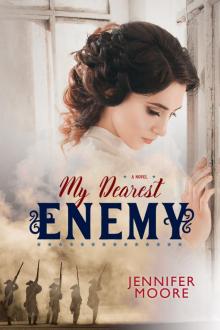 My Dearest Enemy
My Dearest Enemy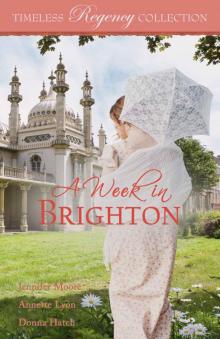 A Week in Brighton (Timeless Regency Collection Book 13)
A Week in Brighton (Timeless Regency Collection Book 13)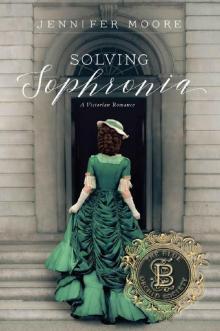 Solving Sophronia (The Blue Orchid Society, #1)
Solving Sophronia (The Blue Orchid Society, #1)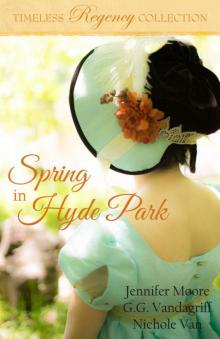 Spring in Hyde Park
Spring in Hyde Park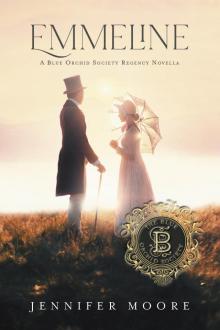 Emmeline
Emmeline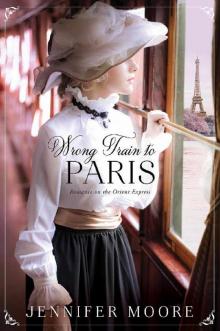 Wrong Train to Paris (Romance on the Orient Express, #2)
Wrong Train to Paris (Romance on the Orient Express, #2)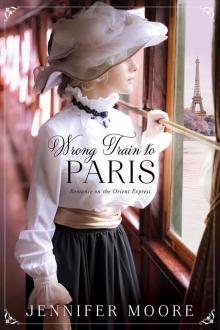 Wrong Train to Paris
Wrong Train to Paris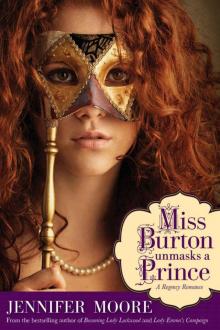 Miss Burton Unmasks a Prince
Miss Burton Unmasks a Prince Safe Harbor
Safe Harbor The Sheik's Ruby
The Sheik's Ruby Change of Heart
Change of Heart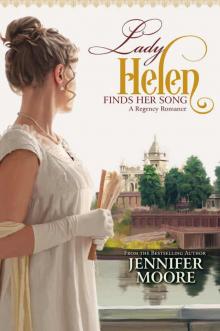 Lady Helen Finds Her Song
Lady Helen Finds Her Song Simply Anna
Simply Anna